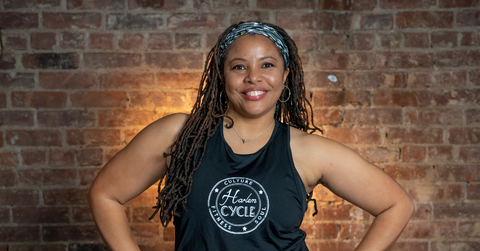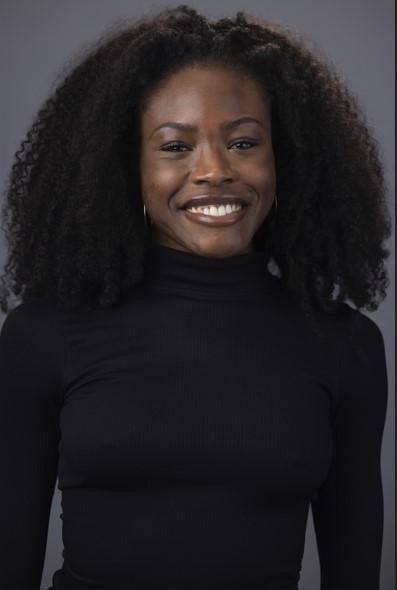Tammeca Rochester, CEO and Founder of Harlem Cycle, left her career as a mechanical engineer at Colgate-Palmolive to fill a gap she saw in her Harlem community. She found there was a lack of accessible gyms and facilities. Tammeca’s personal interest in cycling which stems from her childhood in Atlanta, led her to open Harlem’s first and only cycling studio in 2016.
With two locations, Tammeca uses her business to eliminate the pressure those may feel when trying to incorporate fitness into their lives by promoting community over competition. She hires trainers who can connect with clients on a genuine level, offers online classes for those who can’t always make it to the studios but want to remain connected, and reminds her clients that they don’t have to look perfect to be in shape. Harlem Cycle has been featured in the New York Times, Essence, and Tammeca recently took the stage at TedxHarlem to discuss her advocacy for holistic wellness in underserved communities.
Her Agenda spoke with her to learn more about how the idea for the studio came to be, juggling her personal life with her professional life, and how feedback from the cycling community she’s cultivated keeps her going through rough times in business.
Her Agenda: So Tammeca, there are a lot of articles out there on you, the business owner, and your journey with Harlem Cycle. But who is Tammeca, the woman?
Tammeca Rochester: Every day, I try to understand who that person is and I don’t know if there is one set answer. Tammeca the woman is a Jamaican-born immigrant who loves family, her son is the absolute star of her universe, and just loves being around people. That has always been what fuels me, the need to be around a community and be around family. Tammeca is complex and simple all at the same time.
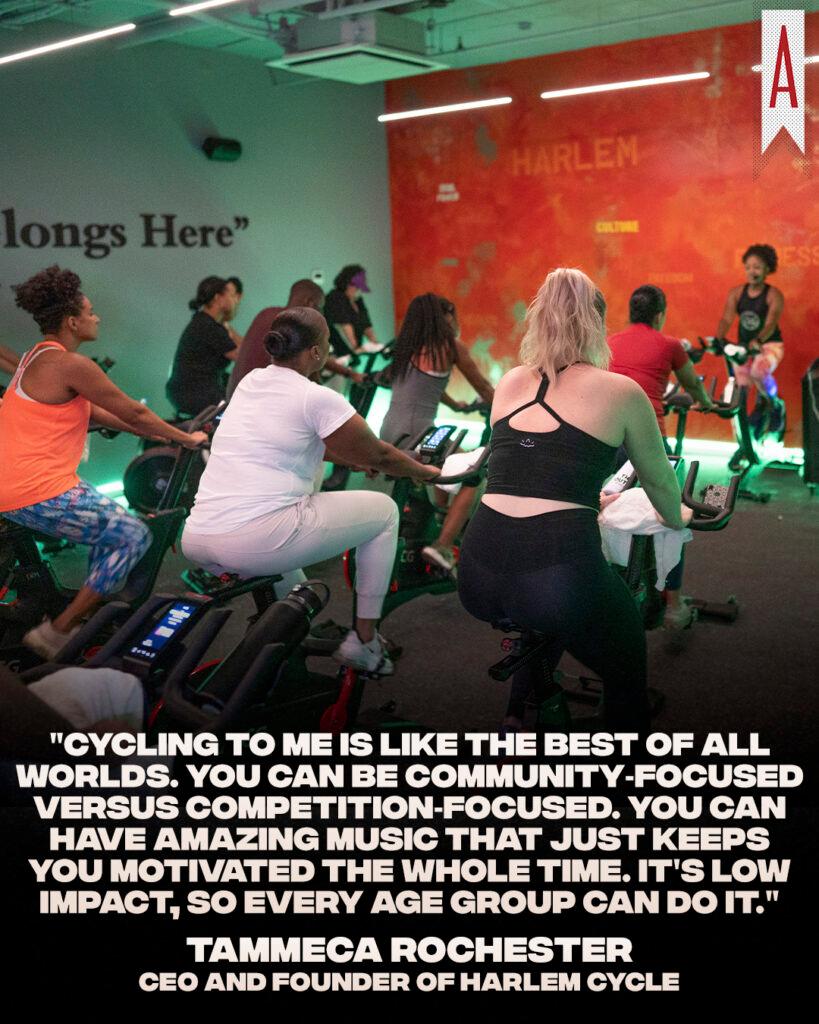
Her Agenda: You went from the corporate world, working in engineering and marketing, I think you were a mechanical engineer. Going from that to being the owner and founder of Harlem Cycle, how did you decide to make this shift?
Tammeca Rochester: I saw a need and I wasn’t happy with what I thought would happen if I didn’t solve the problem myself. It’s part of that engineer in me that’s always still there, like, okay, there’s a problem, let’s solve it. I saw in our community there [were] no cardio-focused exercises, there [were] no studios or gyms. They had the bigger gyms like the New York Sports Club and the YMCA, but they didn’t tailor to what I felt we needed, and what I felt we needed was more of a connection for people to stay committed, and passionate about their wellness. You [have] to feel a sense of belonging and not like you’re just [a] number walking into a space. And so I thought, okay, well, maybe the studios will eventually come Uptown, but then I saw again, the problem was not also that these studios were missing for our neighborhoods, but they weren’t right for our neighborhoods. They didn’t have the values and the things that I felt our community needed.
Her Agenda: Why cycling?
Tammeca Rochester: Because it’s just so fun! Honestly, cycling to me is like the best of all worlds. You can be community-focused versus competition-focused. You can have amazing music that just keeps you motivated the whole time. It’s low impact, so every age group can do it. And it’s like, we all grew up riding a bike. So it’s always nostalgic to me to be like, okay, so I’m not on the streets [anymore], but I’m inside, but I’m doing what I love. That takes me back to a great childhood memory. It was my first little sense of independence as a child. We learned how to ride a bike and my mom would let us ride it around and everything. It was like, just being able to be independent from mom. Once she showed us how to do it, that was it. We were on our own.
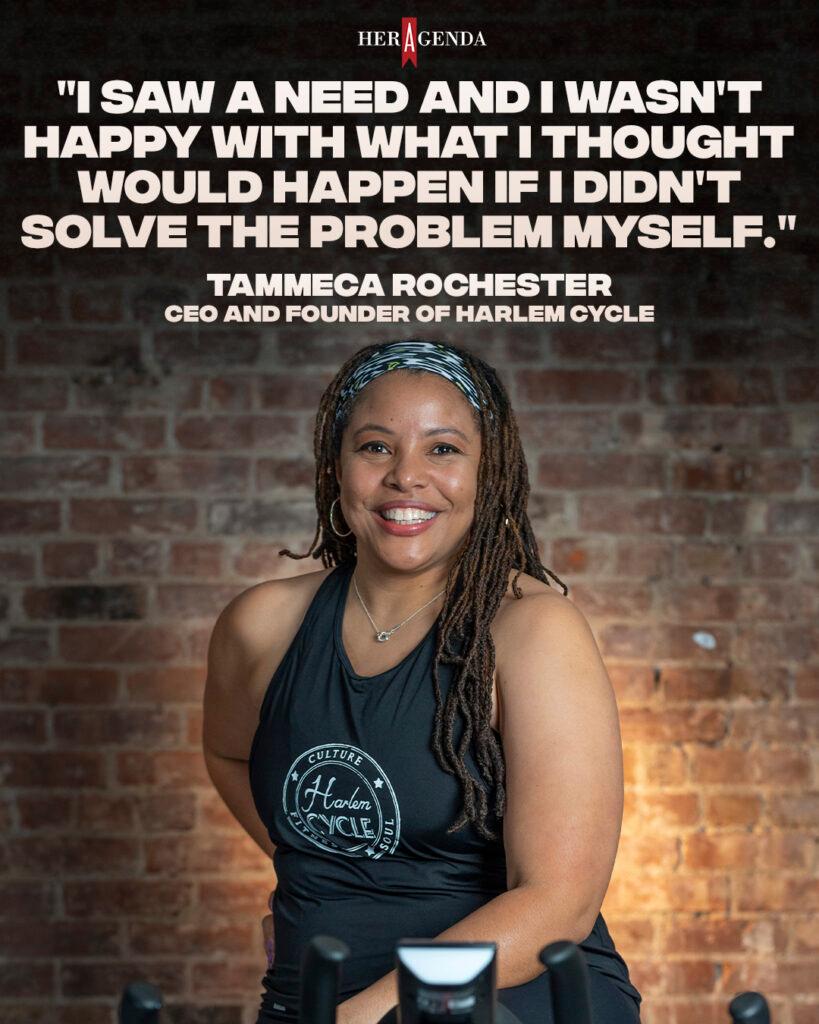
Her Agenda: What was the adjustment like for you moving from one world to another?
Tammeca Rochester: I’m still adjusting, honestly. The first year I did both. I’d work nine to five and then open the studio. I think the adjustment came to me by giving myself more grace and realizing that I’m working equally as hard. In the middle of the day, I might pause, take my son, and we might go do something and then I would go to the studio at night. It’s not that [I’m] not being productive, it’s realizing that I am now more in control of my time, and I don’t have to do nine to five. So that took a lot of mental adjustment to not be stuck on this clock that had been so ingrained in my mind for years. And realizing that I’m working equally as hard, just at different timing.
Her Agenda: You mentioned your son and not working [traditional] 9-5 [hours]. What does your day-to-day look like as an owner and founder of a cycle studio?
Tammeca Rochester: On the days that I’m not teaching, I wake up, check in with the team that is at the studio, and then I take my son to school and I come back. [I’ll] respond to client emails, and probably make some breakfast. Then I go do a fitness class for myself and I enjoy fitness classes. I’m the kind of person who loves a good 9-10 a.m. class that’s nice and empty, just me. I take a class and then I come back and that’s when I start working on our newsletters, working on our social media, doing payrolls, stopping at the studio and checking inventory, and doing things like that. And then by three o’clock, I go pick my son back up, and then we’ll do stuff like we’ll go for a walk, or we’ll stop and do something that he wants. He usually wants some kind of food or snack in the meantime, then we’ll come home, and start homework. And then at five o’clock, I’m back in the studio with our teams. [Sometimes] I’m teaching, or I’m just there with their front desk staff. And then I’m usually back home by 7:30, or 8 o’clock.
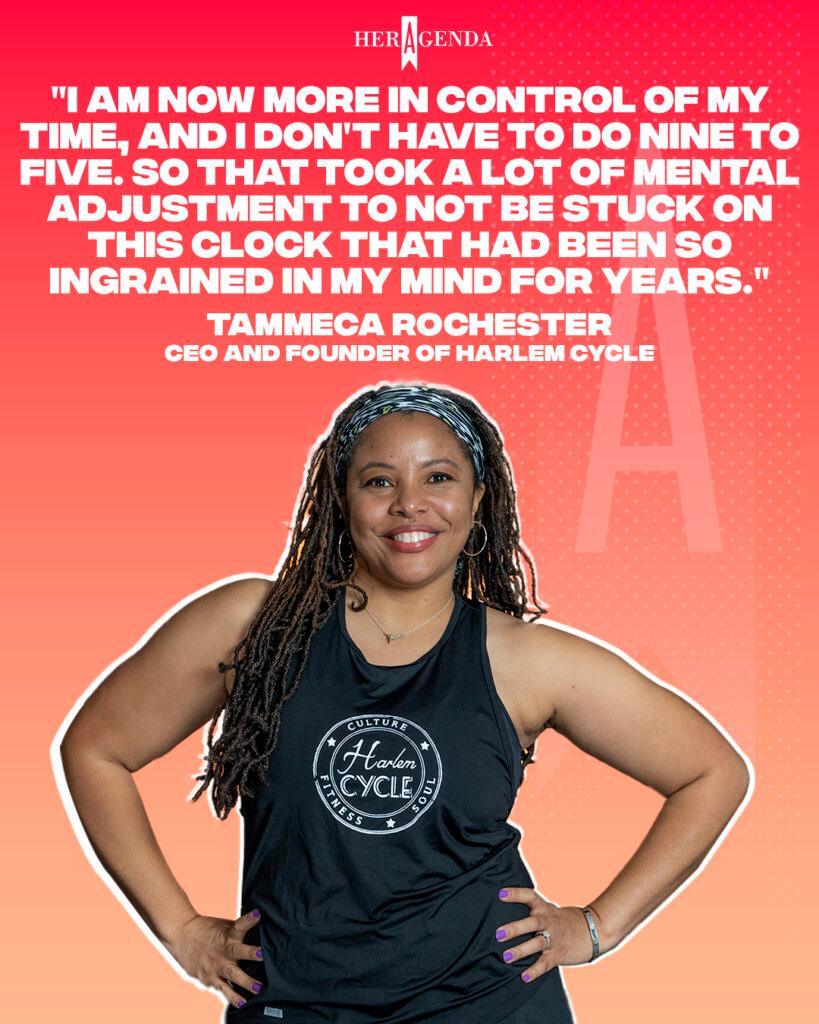
Her Agenda: I see on the website that you offer online class options along with the in-person ones. Did the online class model come from running your business through the pandemic?
Tammeca Rochester: We actually started that because of the pandemic, it was never our mission to be online. For us, everything is about connection. But of course, the pandemic ended up happening and no one could plan for that. So we switched to doing on-demand classes, and then really just saw a market.
We were getting people who weren’t even our customers, they were people who lived outside of New York City, on our on-demand platform. The feedback we were getting was they were looking for relatable content, from people who fit the image that they want to have of themselves. We’ve kept it going since then.
Her Agenda: Going through the pandemic was, not, even a hurdle, just a huge redirect. I’m sure other ups and downs come with being a business owner in general. How do you remain resilient and work through those ups and downs that may come along?
Tammeca Rochester: I always have to sometimes look back and be like, ‘Okay, is it worth it Tammeca?’ Like, [are] these late nights and all the things that [I] do as a business owner, is it worth it? And the answer is always yes. Right? We get these amazing stories from our clients, who will tell us the impact that we’re having on their lives. If I was to go tomorrow, and knowing that I changed one person’s life, that [would] be enough for me. Knowing that we are doing that daily, is what keeps you going.
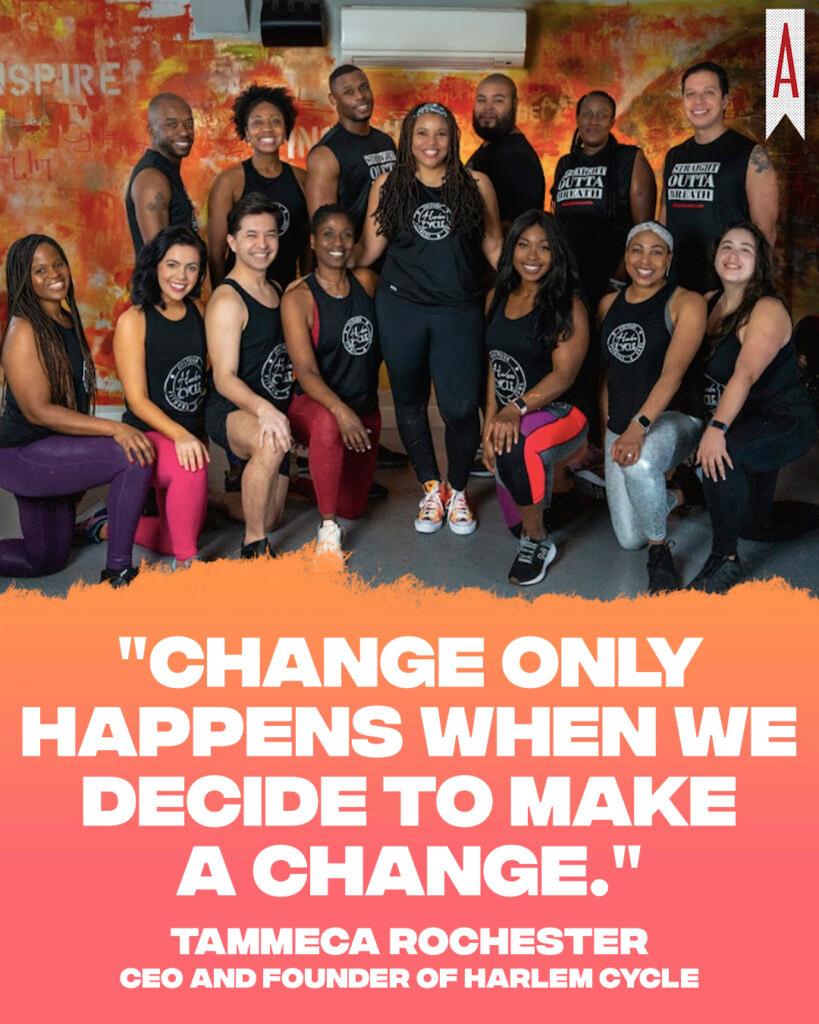
Her Agenda: What about your son? What does he think of your business?
Tammeca Rochester: When we opened, he was just four and now he’s 12. He’s kind of grown up with the business. And clients have grown up watching him grow up, so it’s a very interesting thing. He’s a very business-oriented person. The teachers at school when I went to pick him up [were] like, ‘You know, Michael gave us cards and flyers for the studio,’ and I was like, what?
He has such a business mindset now, and I love it, I love every part of it. We call him our unofficial intern.
Her Agenda: As an entrepreneurial and ambitious woman, how do you balance your personal and professional time?
Tammeca Rochester: I just recognize there’s no such thing as really a balance. Some days, I’m good at one, some days I’m not so good at the other, and it’s okay. I just know that tomorrow I’ll pick up on the next one. If today I’m excellent at business, because we had pizza for dinner, tomorrow, Mommy might cook something and I might have missed a couple of emails. So to me, the balance is not on a day-to-day basis, but in the overall grand scheme of things.
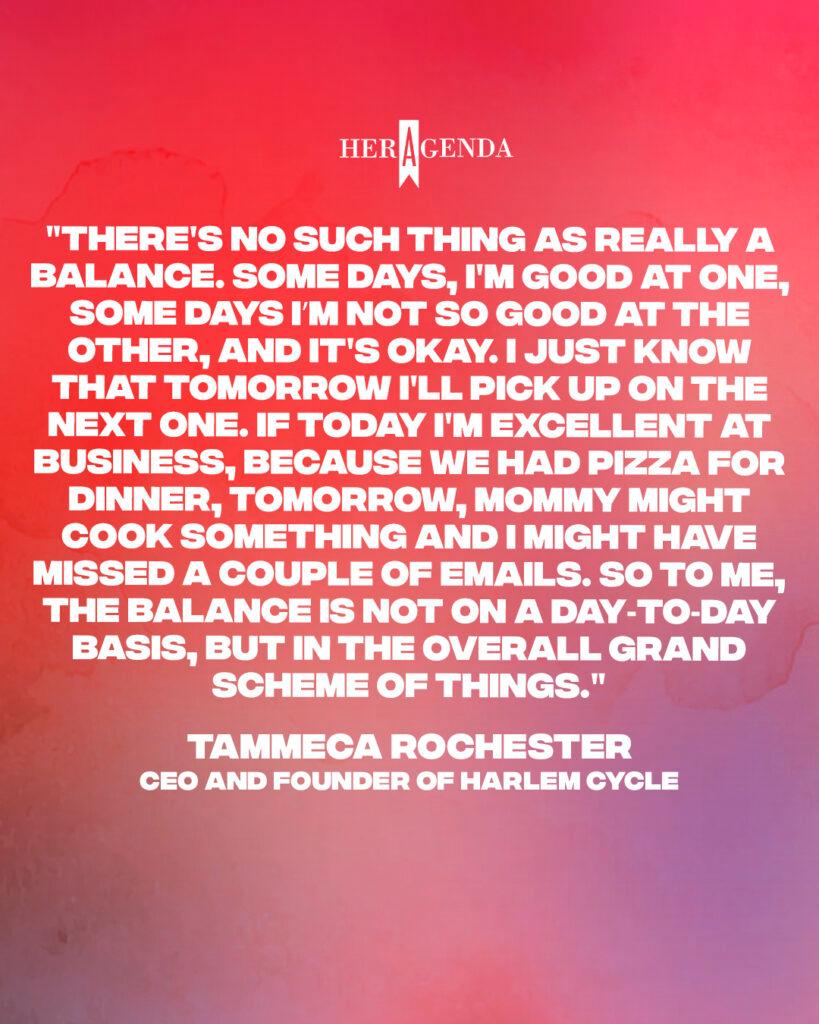
Her Agenda: I feel like a major takeaway from Harlem Cycle, outside of the physical fitness aspect, is that you saw a gap in your community that needed to be filled, and then you decided to fill it. What is some advice that you would give to other women who see a gap in their community and want to make a change in that way?
Tammeca Rochester: I say go for it. Change only happens when we decide to make a change, right? We can’t always wait for other people. Sometimes the solution from other people isn’t the right solution. Trust your gut on it.
[Editor’s note: This interview has been edited for length and clarity.]

